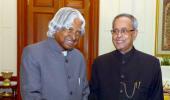
His face doesn’t grab airtime. His comments do not court controversy and his actions seldom make news. The National Democratic Alliance's man for the country’s highest constitutional post is as low profile as can be.
But Bihar Governor Ram Nath Kovind, 71, has attributes that not many in the large NDA family can boast of.
The Kanpur-born former lawyer is a Dalit leader, is known for his organisational skills and is a loyal member of the Bharatiya Janata Party.
Names of several presidential probables from the NDA stable were doing the rounds but Kovind, a former national spokesperson of the party, was not among them.
While the choice may have surprised political watchers, it’s an astute move for a party working overtime to expand its social base and win over new constituencies.
Kovind, who could well be India’s 14th president if the numbers stack up, is married and has a son and a daughter.
BJP chief Amit Shah said the party’s parliamentary board went through a long list of potential candidates before choosing Kovind, who was its MP in the Rajya Sabha for two terms and headed its Dalit Morcha.
Kovind’s links to the party's controversial Hindutva politics, however, are tenuous.
Sources say he has been drawn more to the politics of social empowerment of Dalits and other weaker sections than the plank of religion.
Largely seen as an affable man, he has had a quiet innings as the governor of Bihar, a post that he took up in August 2015, months before assembly elections were held in the state.
It is an acknowledgement of his non-confrontational conduct that Bihar Chief Minister Nitish Kumar, who has been battling the BJP in the state, lavished praise on him on Monday, saying he had done ‘exemplary work’ as governor.
Kumar, who had earlier been critical of the NDA government’s appointment of Kovind as governor, had then said he was not consulted about the move. But since then, the two have been getting along well, the sources said.
Kovind, a commerce graduate who also studied law at Kanpur University, practised in the Delhi high court and the Supreme Court. He was also the Central government's standing counsel in the apex court from 1980-93.
His official profile on the Bihar governor's website describes him as a crusader for ‘rights and cause of weaker sections of society specially Scheduled Castes/Scheduled Tribes/OBC/ minority...’ from his student days.
Shah on Monday highlighted his ‘humble background’ and work for the cause of weaker sections as he appealed to the opposition parties to support Kovind as a consensus candidate.
The party's top brass would hope that by sending the only Dalit after K R Narayanan -- and the first from the Hindi heartland -- to Rashtrapati Bhavan, the BJP would win over the community.
The BJP has been seeking to widen its base beyond its traditional constituencies of upper castes and trading classes and has succeeded to a large extent, as seen in the UP assembly polls.
Kovind, who headed Dalit Morcha from 1998 to 2002, also led the All-India Koli Samaj.
Elected to the Rajya Sabha in April 1994 from Uttar Pradesh, he served two consecutive terms till March 2006.
He joined a stir by SC/ST employees in 1997 when Dalits and others protested against orders issued by the central government, which were rescinded by Atal Bihari Vajpayee when the NDA came to power.
As an advocate, Kovind took the lead in providing free legal aid to weaker sections, especially the SC/ST women, and poor and needy girls under the aegis of the Free Legal Aid Society in Delhi.
Known for his work in the field of education, he served as a member on the board of management of the Dr B R Ambedkar University, Lucknow, and was a member of the board of governors of the Indian Institute of Management, Kolkata.











